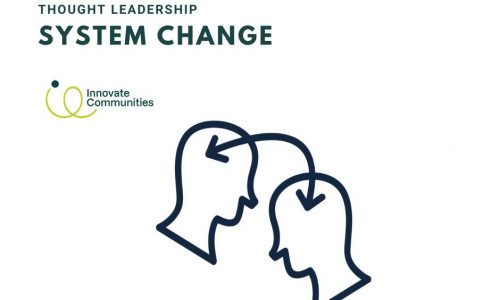Meet Karyn McCluskey, the nurse turned forensic psychologist aiming to transform the UK nation for good. How? Through system change, leading a landmark reform trigging a U-turn in policing, youth justice and housing resulting in the successful reduction in violent crime in Glasgow – effectively changing the city. Karyn McCluskey (now CEO Community Justice Scotland) began her journey by working across systems to reduce knife crime in Glasgow, revolutionising the Violence Reduction Unit (VRU) in Strathclyde Police and reducing knife crime. Mapping and analysing the scale of the challenge taught her that there were three ways to change business-as-usual in this space: interrupt the transmission of the ‘disease’ of homicide; change behaviours; change norms. Now across the UK and Ireland, community innovators, stakeholders and politicians are adopting her learning and approach to shift the focus of a long-running challenge by working towards changing business-as-usual via adopting a whole-system approach to stop youth violence.
When Karyn started in the Unit, described as “a think tank that does stuff”, it fostered awareness[2] and initiated research and projects that were taken up by other agencies. It was the police mission to arrest criminals and bring them to trial so they could be punished. Karyn was frustrated with that approach, “people weren’t looking at the causes behind the violence”. [3] Why did the child bring a knife into school? Did anybody go back and ask the child why? Was it an act of violence or was it that they felt they needed to protect themselves? Therefore, could we look at why they needed to protect themselves and resolve that?”
The current approach was having little impact on knife crime and created grief and distress. Her boss told her to do something different, she did. Karyn encouraged the system to reimagine itself. She shifted how people inside and outside the system saw violence (its contagious, you can catch it and pass it on), how people thought of their purpose (eliminating knife crime rather than arresting perpetrators), how they needed to work (more akin to a public health campaign to prevent transmission), and what success amounted to (a city free from violence rather than criminals in jail). By reframing the purpose, she propelled a collaborative effort, bringing together the police and social services, education and employment, voluntary and community groups.
In Glasgow, unforeseen solutions emerged, new relationships formed and resources flowed in new ways through the city. Economic development and training initiatives targeted young men at risk to give them a better chance of finding work. Dentists were enlisted to fix the broken teeth of men going for their first job interview. There was much more emphasis on early intervention in families where there were warning signs of domestic violence.
System innovators, like Karyn, bring about profound shifts in the patterns of relationships which define a system. Big changes in any industry usually involve a shift in the ways the parts are related to allow people and organisations across the system to learn how to rise to a new level of performance and generate better outcomes, and new relational architecture often emerges. For such a shift to count as genuine change, changes must shift power and purpose; must enable enhanced learning across the system; and that in turn generate better outcomes.[4]
In 2016, together with my team, local and national stakeholders we co-produced a living lab/social innovation hub to work on new ways of solving place-based challenges with citizens, testing prototypes and services based on user insights. The important part of this journey for us was our learning. During our work in this space, we co-produced impactful solutions with and for citizens, however, we were not tackling the root causes of the issues faced by citizens. This led us to take a deep dive into how we could start to tackle the root causes to focus our work on community-driven systems change and build an approach/methodology to deliver same.
For us it is not about the problem itself but developing an approach/methodology to solve the problem to shift the system and transform our business-as-usual mindset. To move forward we will be working to build strategic competencies using a portfolio-based approach, based on research and practice in other countries and via our own community-driven innovation approach in Ireland. This is just one approach to help a broad range of development practitioners (the Karyn’s of the world) to prepare for, engage in, and manage systems transformation in complex development spaces (UNDP, 2022)[5]. The Strategic Innovation Unit of the United Nations Development Programme uses a portfolio approach to address complex societal challenges in different parts of the world…
“The most extensive challenges we face today are comprehensive and systemic, which means that our response to these challenges must reflect similar principles.”[6] A portfolio-based approach is a response. In its simplest form, this is a methodology that seeks to develop, test, learn and scale (where appropriate) a suite of interventions that are complementary and can shift complex systems by focusing on multiple intervention points at a given time. In this way, the portfolio is a platform for strategic learning and action: to understand the dynamics that occupy the problem space, and over time more accurately understand the aligned interventions.[7]
So, what do we need to do in Ireland to move forward in this space? All thoughts and comments are most welcome.
[1] https://www.systeminnovation.org/article-the-patterns-of-possibility
[2] https://www.irishtimes.com/news/crime-and-law/would-scotland-s-solution-to-knife-crime-work-in-ireland-
[3] https://www.salzburgglobal.org/news/latest-news/article/a-sum-of-its-parts-the-whole-system-approach
[4] https://www.systeminnovation.org/article-the-patterns-of-possibility
[5] https://www.undp.org/publications/system-change-guidebook-adopting-portfolio-approaches
[6] Mikael Seppälä, Radical Uncertainty Requires Radical Collaboration: Stepping Stones Towards System Transformation with Innovation Portfolios (Sitra, May 2021).
[7] file:///C:/Users/fiona/Downloads/UNDP-RBAP-System-Change-A-Guidebook-for-Adopting-Portfolio-Approaches-2022.pdf
[8] Savaget, P., Ventresca, M.J., Besharov, M. and Jacobson, J. (2022) Unpacking Systems Change Philanthropy: Five Alternative Models. Skoll Centre Working Paper. Oxford: Skoll Centre for Social Entrepreneurship



Find Us
© 2025 Brand and Website by Out of Place Studio